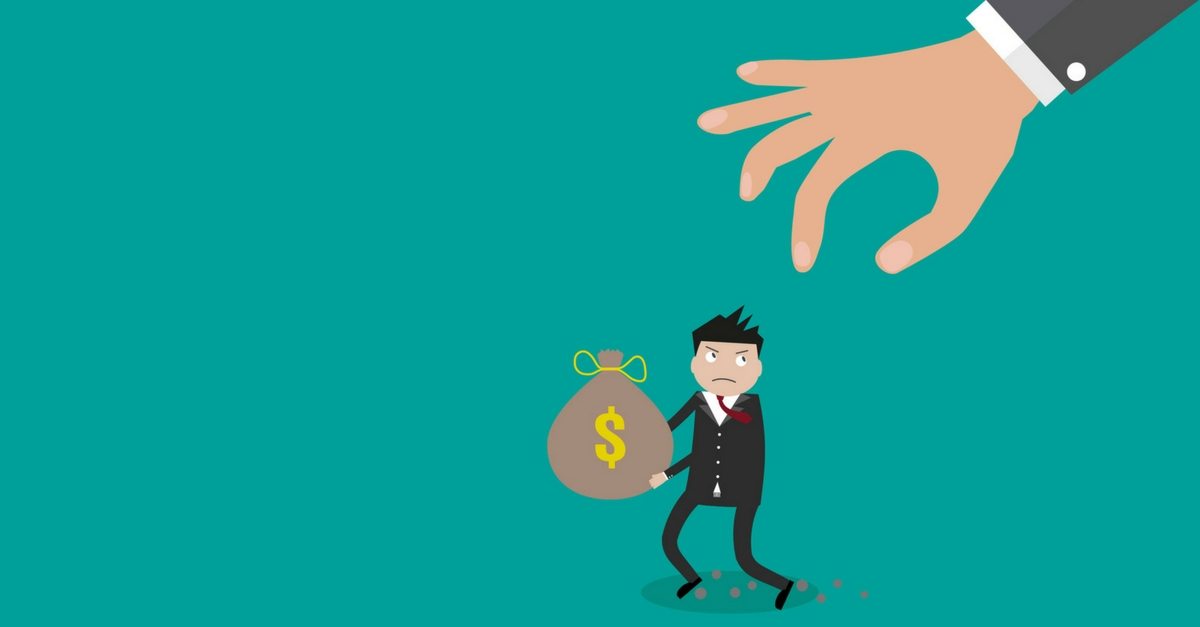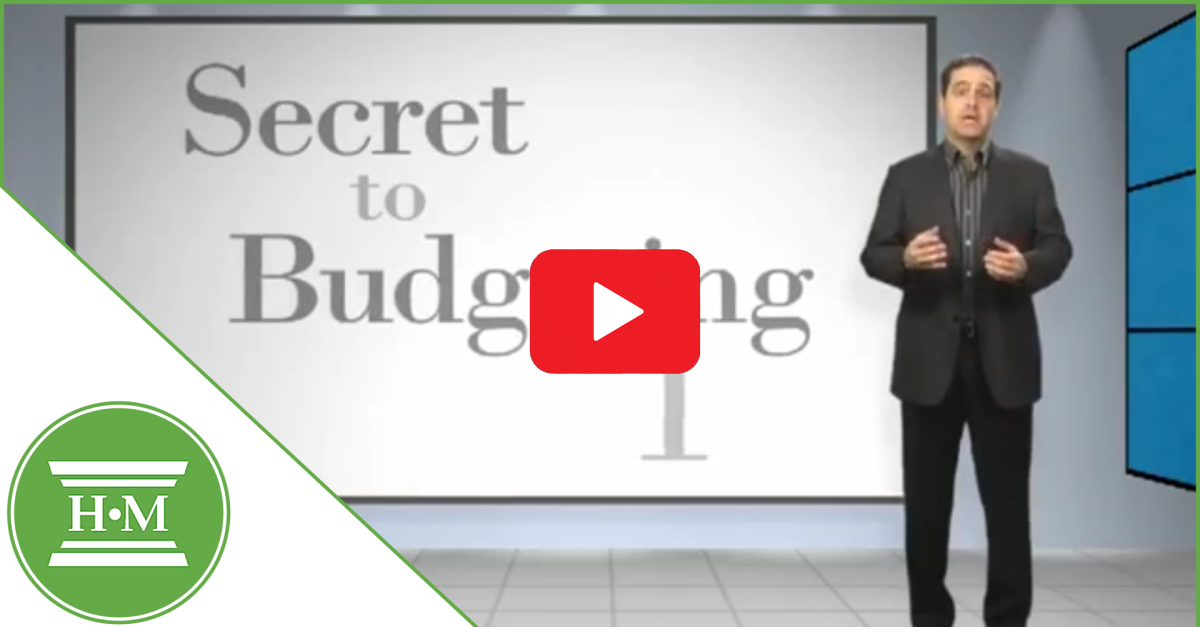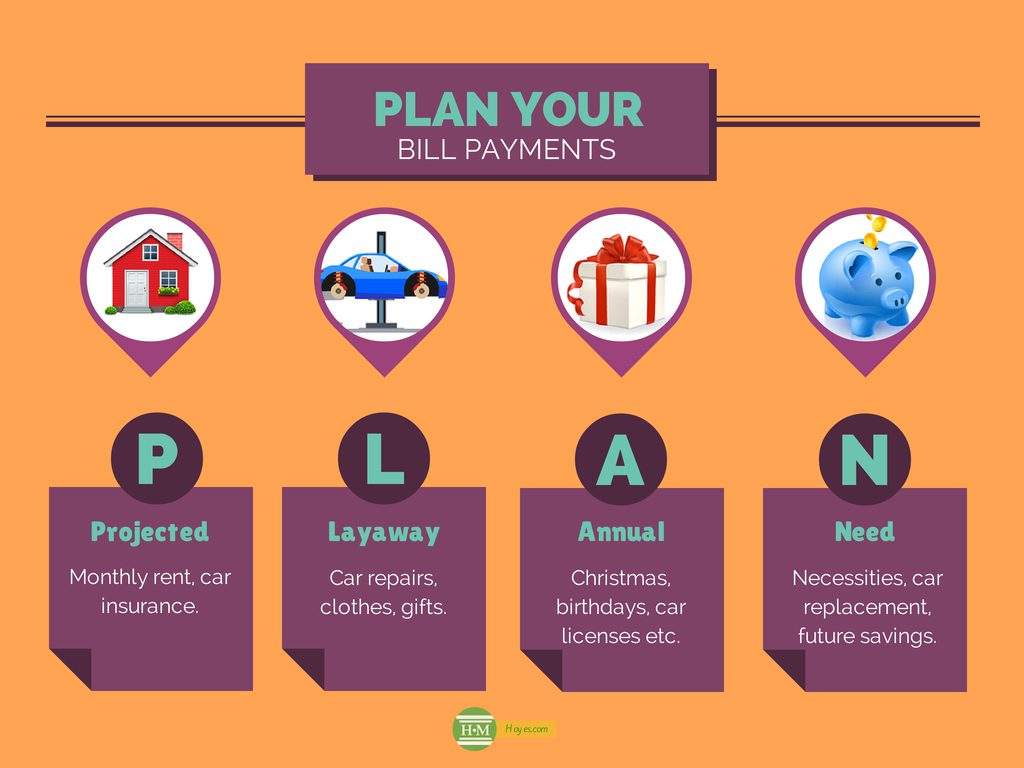
One of the most common resolutions is to make a budget and stick to it. I have some advice for you: Don’t bother.
Budgets are like diets: they are hard to do, and after a week, or a month, you give up, because it’s too difficult. Think about it: are you really going to carry a pencil and paper with you and write down every penny you spend? Will you write down each cup of coffee you buy at the coffee shop? Will you go home every night and punch the numbers into your computer, and then create graphs and spreadsheets to analyze everything? Perhaps you will but many won’t.
To successfully manage a budget you need to be very disciplined. You need to stick to it. If you are very disciplined and love that phone app that helps you manage your budget, great. But what if you are not highly disciplined? What if you don’t know how to work a spreadsheet, or if you don’t have time to record every penny you spend? I have a solution:
THE SECRET TO BUDGETING:
Instead of budgeting, pay your bills as often as you get paid.
That’s it. That’s the system. If you get paid bi-weekly, pay your bills every two weeks, on payday.
Here’s an example of how you might pay your hydro bill.
You get paid on January 13 and January 27, and your hydro bill is due on the 30th of every month. Normally your plan would be to use $100 from your January 27 paycheque to pay your hydro bill. That makes sense, but your rent is due on February 1, and your car insurance is due on February 2, so you know your paycheque won’t last that long.
Here’s a better plan:
- Use internet banking to pre-program a $50 payment, every payday, to hydro. If you send $50 on January 13 and $50 on January 27, by January 30 you hydro bill is paid. No worries.
- Even better, in May you might get three paycheques, on May 1, 15 and 29, so your May hydro will get three payments from you. By the end of May you will be $50 ahead with hydro.
Think about that: You will be ahead on your bills. Instead of always “playing catch up”, you can get ahead and stay ahead.

Part 1: Today, I’m going to tell you the secret to budgeting. We all know we should have a budget, but budgeting is hard and takes a lot of time, so we don’t do it. So, here’s the secret to budgeting. Don’t do it. That’s right, just don’t budget. My name is Doug Hoyes, I’m a chartered accountant and co-founder of Hoyes Michalos and Associates, and over the last 25 years, I’ve been the Trustee and have personally helped more than 10,000 people file personal bankruptcy or a consumer proposal, and here’s what I’ve learned. People get into financial trouble when they lose their job or get divorced or get injured and can’t work. The people with savings and good budgeting skills can survive a shock like that but if you don’t have savings and don’t know how to manage your money, you may end up having no choice but to go bankrupt. If you don’t know where your money goes you get into trouble. So, why am I telling you not to budget? Because budgeting is hard, you don’t know how to work a spreadsheet, and we don’t have time to keep track of everything, so we fail. I could tell you to write down every dollar you spend and categorize your expenses on a spreadsheet, but that takes a lot of time and after a week or a month, you probably give up. So, how can you manage your money, but not budget? Here’s the secret: pay your bills as frequently as you get paid. That’s it, that’s the secret, if you get paid every week then pay your bills every week. Let’s say your hydro bill is $200 a month. You get a bill every month, so you pay it every month, right? Wrong. You pay it every week because you get paid every week. You send the hydro company $50 every week on payday. By the end of the month, you’ll have sent them $200, so they’re happy. Now, you’re sitting there watching this video saying, “well that’s stupid, paying 4 times a month is a lot more work than paying once a month, and it’s more complicated”. Wrong again. Here’s what you do, you go online and do everything through internet banking. You know that you get paid every Friday, so you go to your computer and program a payment for $50 for the next 6 months. Done, your hydro bill is paid for the next 6 months. You don’t need a budget to figure out how to pay your bills, because you’ve already paid your bills. Here’s the payoff for you, no more worries, you get paid on Friday and all of your bills automatically get paid on Friday, so when you go to the bank on Saturday you know exactly how much money you’ve got to live on for the rest of the week. You don’t have to set money aside for your hydro bill in 2 weeks because it’s already paid. Now I know you are sitting there saying “Ok I get it, I spread over my hydro bill over the whole month, but I can’t do that with my rent, my landlord wants his check once a month not once a week, what do I do about that? And what about saving for the future, isn’t that the whole point of budgeting? I want to save for my kid’s education, or for a new car or a house, paying weekly is fine for bills but what about savings?” Those are all excellent questions, but I’ve talked long enough in this video, so I’m going to record a second video to answer those questions. For now, try it, don’t budget, just pay your bills as frequently as you get paid and I think you’ll see that your life will be simpler and a lot less stressful.
Part 2: In my first video on budgeting, I told you that the secret to budgeting is, don’t do it. Budgeting is complicated so unless you’re an accountant or really like working a spreadsheet, chances are after a week or a month, you’ll give up. Instead of budgeting, my solution is to pay your bills as often as you get paid, so if you get a paycheck every week, pay your bills every week. If your phone bill is $100 per month, instead of paying $100 per month, pay $25 per week. It’s easy because most of your monthly bills like hydro, and cable and phone, except internet payments, so go online and pre-program in all of your payments on payday for the next 6 months, done. Paying every week or every 2 weeks, or however often you get paid is easy if you can pay your bills online, but what about bills you can’t pay online? You probably pay your rent by giving your landlord post-dated checks each month, or maybe you pay cash for your rent each month. Your landlord probably doesn’t want to check every week because it’s a lot of work for them to deposit a check each week. So, what do you do? Simple. You open a second bank account for your planned payments. These are payments you plan for but don’t pay every paycheck. So, what goes into this plan account? First your projected payments for the next month, things like your rent, car insurance, or anything else that’s coming up in the next month. Then you’ve got your layaway money. This is money you’re laying away for purchases over the next few months like car repairs, or clothes for the kids or maybe even a gift for a wedding you’re going to in the next few months. Next are your annual payments, like Christmas, birthdays, car license renewals or anything else that only happens once a year. Finally, you put in your need payments for necessities that you need to save for. This can be anything from saving for car repairs or a replacement car or even for your kid’s education fund. That’s four categories: projected payments like rent and care insurance for the month, layaway payments for expenses over the next few months like car repairs or clothes for the kids. Annual payments like Christmas payments, vacations and birthdays, and needs like car repairs and savings. Once it’s set up, it’s simple your paycheck goes into your main checking account on payday and you pay whatever bills you can pay every payday. Every payday you have your bank automatically transfer money to your plan account to pay everything that you can’t pay every payday. So, let’s say that my rent is $1000 per month, I get paid every week, so every week I have my bank automatically transfer $250 on payday from my main bank account to my plan account. I then give my landlord post-dated checks from my plan account dated for the 1st of every month or whatever day they want to get paid. My landlord’s happy because they are getting the rent check on the 1st of every month, and I’m happy because in my mind I’m paying my rent every week when I get paid. This plan system works for every bill that you don’t pay every payday. Rent is the obvious one, but another example might be car insurance. Remember your plan account isn’t just for rent, you can also use it for annual bills. For example, you probably renew your car license plate sticker once a year. If it costs $120 per year, you need to put $10 per month in your second bank account, or $2.50 every week into your plan account. Another obvious annual expense would be birthday presents or Christmas presents. In my business, the busiest time of the year for people with debt problems is after Christmas when the Christmas bills come in, so plan ahead. Decide right now how much you’re going to spend on Christmas this year. If you can decide in January, you have a year to save. The longer you wait in the year the more you have to save each month. Decide what you’ll spend on Christmas presents, the turkey, the trip to Grandma’s house and then divide it up over the number of paychecks you get between now and Christmas. If you want to spend $1200 this Christmas, and you have 12 months to save, you need to transfer $100 per month, or $25 per week from your main bank account to your plan account. If it’s 6 months to Christmas, you need to save $50 a week or you need to reduce what you plan to spend this Christmas. If you want to make a budget for yourself, great, do it. But if you don’t have the time, or if you’re afraid to get off track, don’t budget, just do 2 things. First pay your regular bills automatically from your main bank account every payday, second use a plan account to pay your projected bills that are coming up, your layaway purchases over the next few months, your annual bills and your needs to stay on track. It works, try it.
Why paying your bills every payday works better than a budget.
No worries: You get paid on Friday, and all of your bills automatically get paid on Friday, so when you go to the bank on Saturday you know exactly how much money you’ve got to live on for the week.
No budgeting: You don’t have to set money aside for your hydro bill in two weeks, because it’s already paid!
You are always ahead on your bills, never behind: In an extra pay month, you pay extra. If you get paid weekly, four times a year you get five paycheques in a month. Great! That means you’re making an extra weekly payment to hydro that month, and you won’t even miss it. A year from now, if you don’t miss any payments, you’ll be a month ahead with hydro, and everyone else! So now, if you get laid off, or need to skip a payment, no problem! You’re a month ahead!
What about bills I can’t pay every payday?
Paying your bills every week is easy if you can pay your bills online, but what about bills you can’t pay on line? You probably pay your rent by giving your landlord post-dated cheques each month. Your landlord probably doesn’t want a cheque every week, because it’s a lot more work for them to deposit a cheque each week. And what about expenses like your car insurance or holidays that come up once a year?
The secret to monthly bills: The PLAN account
For bills that you can’t pay weekly, open a second bank account for your monthly planned payments.
For monthly bills, deposit the money each payday in your PLAN account.
If your rent is $1,000 per month, and you get paid every week, have your bank automatically transfer $250, on payday, from your main bank account to your second or PLAN bank account. You then give your landlord post dated cheques from your PLAN account, dated for whatever day they want to get paid. Your landlord is happy because they’re getting their rent cheque once a month, and you’re happy because you are paying your rent every payday. This PLAN system works for every bill that you don’t pay every payday.
Use your PLAN account for annual bills
The PLAN account works great for annual bills. You renew your car license sticker once a year, so instead of trying to find $120 on your birthday when your sticker renews, put $10 per month, or $2.50 per week, in your PLAN account on payday.
This works great for other annual expenses, like Christmas, birthdays, and your annual vacation.

What about saving for the future?
Your PLAN account works for savings and emergencies. You know you’ll have some car repairs in the future, so start putting $10, or whatever, in your PLAN account each payday for future car repairs.
You want to save for you children’s education? Or retirement? No problem, put what you can afford in your PLAN account each payday. Even better, start an RRSP or RESP and contribute to it every payday. The money will be invested before you see it, so you won’t be tempted to spend it.
Simple.
And if you really like the traditional method of budgeting we’ve go something for you too. Download our free Excel Spreadsheet Budget Planning Worksheet. It can help you budget your way out of debt or to more savings.
What if your paycheque just doesn’t go far enough?
But what can you do if there isn’t enough money to pay your bills and save? If your cash flow problem is caused by too much debt, we need to talk. At Hoyes Michalos we can help with budgeting, but we can also explain all of your debt relief options to help you deal with debt and get back on track.






